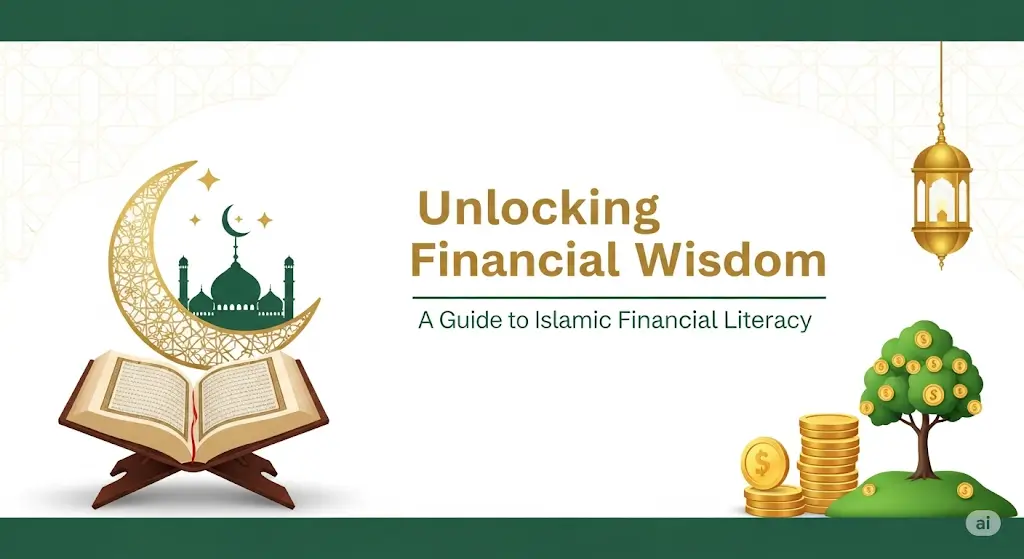In today’s fast-paced world, financial literacy is crucial, especially for practicing Muslims who desire to navigate their financial lives according to Islamic principles. Understanding Islamic finance is not just about managing money; it encompasses a broader worldview that meshes spirituality with financial activities. In this comprehensive guide, we will delve into the fundamental aspects of Islamic financial literacy, including core principles, real-world applications, authentic reviews from practicing Muslims, practical implementation tips, and frequently asked questions (FAQs).
Understanding Islamic Finance
Islamic finance is a system that eschews interest (riba) and promotes risk-sharing. The core philosophy of Islamic finance is derived from the Qur’an and Hadith—two principal sources of Islamic teachings. This system aims to create a framework for ethical and equitable economic transactions. One of the standout features of Islamic finance is the prohibition of riba, which is considered exploitative. Unlike conventional financial systems that thrive on interest-based transactions, Islamic finance emphasizes profit-sharing and collaboration between parties.
Moreover, Islamic finance also encourages investments in halal (permissible) activities and prohibits haram (forbidden) ventures, including alcohol, gambling, and industries that promote unethical practices. This moral compass guides Muslims in making financial decisions that align with their faith. Thus, financial literacy in the Islamic context involves understanding these principles and how to apply them in everyday life.
Core Principles of Islamic Finance
To truly grasp Islamic financial literacy, one must understand the core principles that govern it. These principles serve as a foundation for ethical investing and responsible financial management.
-
Prohibition of Riba (Interest): Riba is often viewed as a form of exploitation. The Qur’an clearly states the disapproval of riba, which leads Muslims to engage in profit-sharing investments rather than interest-bearing loans. This principle encourages equitable involvement between parties, transforming traditional lending into mutual partnerships.
-
Risk-Sharing: Unlike conventional finance, which largely revolves around debt, Islamic finance emphasizes risk-sharing. This mutual risk-sharing promotes economic justice, where both lender and borrower share the consequences of financial transactions. Instruments like Mudarabah (profit-sharing) and Musharakah (equity participation) enable investors to partake in businesses while sharing profits and losses.
-
Investment in Halal Activities: Investments must align with ethical and moral guidelines; thus, Muslims refrain from putting their money into haram businesses. This ensures that earnings are generated from lawful sources, preserving the integrity of financial gains.
-
Transparency and Fairness: Contracts in Islamic finance must be free from ambiguity and deceit. Full disclosure is required at every stage of a financial transaction, ensuring fairness and justice for all parties involved.
- Social Responsibility: Islam emphasizes the social responsibility of wealth. Wealth should not be hoarded but utilized for the welfare of society through charitable acts like Zakat (almsgiving) and community investment.
By internalizing these principles, Muslims can not only align their financial actions with their beliefs but also contribute to a more equitable society.
Real-World Applications of Islamic Financial Literacy
Understanding Islamic finance principles is essential for making informed financial decisions. There are numerous real-world applications where these principles come to life, allowing Muslims to navigate their financial needs without compromising their ethical values.
Using Home Financing Solutions
A common challenge many Muslims face is securing home financing without falling into the trap of riba. Conventional mortgage products often involve interest payments, which contradict Islamic financial principles. However, there are several Islamic home financing solutions available that offer Sharia-compliant practices, such as Murabaha (cost-plus financing), Ijara (leasing), and Musharakah Mutanaqisah (diminishing partnership).
For example, in a Murabaha transaction, a bank purchases a property and sells it to the buyer at a disclosed profit margin. The buyer then makes installments over time, ensuring compliance with Islamic law. This method eases the burden of homeownership while keeping financial transactions ethical. Individuals who have utilized these programs often recount their satisfaction with the flexibility and adherence to Islamic values.
Investment Planning and Asset Management
Investment planning is another area where Islamic financial literacy plays a critical role. Muslims looking to invest must do so in accordance with Sharia law. Investment funds that focus on ethical mining, real estate, or technology can be excellent options for Sharia-compliant investments.
Companies such as Amana Mutual Funds or Saturna Capital provide vehicles for Muslims seeking ethical investments. A review by Sarah J., a practicing Muslim from California, highlights that “using these funds not only assures me that I am adhering to my faith, but I am also able to grow my wealth in a responsible way.” These personal testimonials underscore how proper financial literacy empowers Muslims to pursue their financial goals without compromising their beliefs.
Authentic Reviews from Practicing Muslims
Understanding the practical implications of Islamic finance from the perspective of those who actively practice it can provide invaluable insights. Here are a few authentic reviews highlighting how Islamic financial literacy has positively impacted their lives:
-
Mark A. from Texas: “Learning about Islamic finance changed my perspective entirely. I used to think finance was all about accumulating wealth, but now, I see it as a means to contribute positively to society. My investments are all halal, and I feel a sense of responsibility towards my community.”
-
Nadia S. from New York: “The process of getting a home Sharia-compliant was daunting, but my financial advisor guided me through every step. The transparency and fairness in the contracts made me feel secure in my decisions. I wish more Muslims would seek knowledge in this area; it would foster a sense of community and shared values.”
- Omar J. from London: “I was initially resistant to learning about Islamic finance, thinking it would be too complicated. However, once I grasped the basic principles and their applications, I found a newfound confidence in managing my finances. It feels freeing to know that my money is being utilized in a constructive manner.”
Practical Tips for Implementation
Creating a strong foundation in Islamic financial literacy requires practical steps. Whether you are just beginning your journey or looking to deepen your existing knowledge, these tips can help:
-
Educate Yourself: Knowledge is the cornerstone of effective financial literacy. Numerous online resources, books, and courses can provide foundational knowledge. Websites like the Islamic Finance Institute offer courses tailored for varying levels of understanding.
-
Seek Expert Advice: Engage with financial advisors who specialize in Islamic finance. Their expertise can guide you through complex financial decisions while ensuring compliance with Sharia law.
-
Diversify Investments: Consider spreading your investments across halal sectors to mitigate risk. Diversification not only maximizes your potential for returns but also ensures that your wealth is generated from multiple ethical sources.
-
Stay Informed on Market Trends: Keeping updated on current financial news and trends specific to Islamic finance can help you make more informed decisions. Online forums and newsletters geared towards Islamic finance can be particularly helpful.
- Engage in Community Discussions: Join local or online groups that focus on Islamic finance discussions. These platforms foster knowledge sharing and provide opportunities to learn from others’ experiences and challenges.
FAQs
What is the primary difference between Islamic finance and conventional finance?
The key difference lies in the prohibition of riba (interest) in Islamic finance. While conventional finance often relies on interest-based transactions, Islamic finance focuses on profit-sharing and ethical investments.
How can I know if an investment is halal?
Consulting a knowledgeable financial advisor specializing in Islamic finance or checking the Sharia-compliance of funds through available ratings agencies can help. Numerous certified organizations review funds for compliance based on Islamic principles.
Are there specific Islamic financial institutions I can approach for services?
Yes, many banks and financial institutions operate on Sharia-compliant principles, offering a range of services, including mortgages, investment funds, and savings accounts. Some notable institutions include Al Baraka Bank, Abu Dhabi Islamic Bank, and Qatar Islamic Bank.
Can I use my conventional bank services without compromising my faith?
While it’s essential to avoid interest, some Muslims find that certain banking services—like savings accounts—can be engaged with intention and transparency. However, it’s advisable to consult a scholar for guidance specific to your situation.
Is there a way to convert conventional investments to halal investments?
Yes, numerous advisory services help individuals transition their portfolios to Sharia-compliant investments. This often entails identifying non-compliant assets and replacing them with ethical alternatives.
Conclusion
The journey to unlocking financial wisdom through Islamic financial literacy is one that harmonizes ethical values with practical financial management. By understanding the foundational principles of Islamic finance, practicing Muslims can make informed decisions that align with their faith. Real-world examples and authentic reviews from others reveal that the principles of risk-sharing, ethical investments, and community welfare resonate deeply.
Moving forward, this guide serves as a map for navigating financial landscapes while preserving spiritual integrity. The transition to a more fnancially literate life may pose challenges, but with the right tools, resources, and support, every Muslim can thrive in both their faith and financial pursuits. By implementing the practical tips and continually educating oneself, one can unlock not just financial success but also a deeper connection to their values and community.
























Post Comment